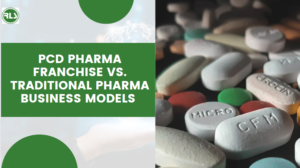PCD Pharma Franchise vs. Traditional Pharma Business Models

Understanding the Legal Aspects of PCD Pharma Franchise Agreements
May 25, 2024
Role of Quality Control in Ensuring Success for PCD Pharma Franchise
May 25, 2024The Indian pharmaceutical industry is a powerhouse, contributing significantly to global healthcare needs. Within this vibrant landscape, two prominent business models dominate: PCD pharma franchises and traditional pharma companies. Both offer distinct opportunities and challenges for aspiring entrepreneurs seeking to enter the pharmaceutical market. This blog post, brought to you by Rowlinges Lifesciences, a leading PCD pharma franchise company in India, aims to shed light on the key differences between these models, helping you choose the path that best aligns with your goals and resources.

PCD Pharma Franchise Model: A Low-Investment, High-Reach Approach
The PCD pharma franchise model operates on a partnership principle. Pharmaceutical companies (franchisors) grant marketing and distribution rights for their product portfolio to individuals or entities (franchisees) within a specific geographical territory. This model allows franchisors to expand their reach and market penetration without the burden of establishing expansive distribution networks. Franchisees, on the other hand, benefit from:
- Low Investment: Compared to traditional pharma businesses, PCD franchises require a significantly lower initial investment. Franchisees typically need to invest in initial stock purchases and marketing materials, but they are not responsible for manufacturing or research and development (R&D).
- Established Brand and Products: Franchisees leverage the franchisor’s brand reputation and established product portfolio, reducing the need for independent brand building and marketing efforts.
- Marketing and Sales Support: Many franchisors provide marketing and sales support to their franchisees, including training programs and promotional materials.
- Faster Market Entry: The PCD model allows for a quicker entry into the pharmaceutical market, bypassing the time and resources needed to develop and manufacture products independently.
However, the PCD model also comes with certain limitations:
- Limited Control: Franchisees have less control over product pricing, marketing strategies, and overall business operations compared to traditional pharma businesses.
- Profit Sharing: Profits are shared between the franchisor and franchisee, potentially limiting profit margins for the franchisee.
- Competition within Territory: Franchisees may face competition from other franchisees operating within the same territory for the same product range.
Traditional Pharma Business Model: Building a Brand from the Ground Up
Traditional pharma companies encompass the entire pharmaceutical value chain, from R&D and manufacturing to marketing and distribution. This model offers the potential for high profits and complete control over brand building and business operations. However, it also requires significant investment in:
- R&D: Developing new drugs or formulations is a costly and time-consuming process, requiring substantial investment in research facilities and personnel.
- Manufacturing Infrastructure: Setting up and maintaining a manufacturing facility that adheres to stringent regulatory guidelines involves significant capital expenditure.
- Marketing and Sales Team: Building a dedicated marketing and sales team to promote products directly to healthcare professionals and pharmacies requires ongoing financial commitment.
- Regulatory Compliance: Traditional pharma companies must comply with a complex set of regulations governing drug development, manufacturing, and marketing.
While the traditional model offers greater control and profit potential, it also presents several challenges:
- High Investment Barrier: The high initial investment required can be a significant hurdle for new entrants to the market.
- Time-Consuming Processes: Drug development and regulatory approvals can take years, delaying market entry and revenue generation.
- Brand Building: Establishing a strong brand reputation in a competitive market requires significant marketing efforts and resources.
Choosing the Right Model: A Matter of Resources and Goals
The choice between a PCD pharma franchise and a traditional pharma business model depends on your individual circumstances and aspirations. Here’s a breakdown to help you decide:
Ideal for PCD Pharma Franchises:
- Individuals or entities with limited capital
- Entrepreneurs seeking a faster entry into the pharmaceutical market
- Those who prefer to leverage an established brand and product portfolio
Ideal for Traditional Pharma Businesses:
- Established companies with significant financial resources
- Entities with expertise in R&D and pharmaceutical manufacturing
- Businesses seeking complete control over brand building and market strategies
Conclusion
Both PCD pharma franchises and traditional pharma businesses play vital roles in the Indian pharmaceutical sector. Understanding the distinct advantages and limitations of each model allows you to make an informed decision that aligns with your resources and long-term goals. Rowlinges Lifesciences, as a leading PCD pharma franchise company, offers a wide range of high-quality pharmaceutical products and a robust support system to empower your success in the PCD franchise space. We encourage you to explore our offerings and connect with our team to discuss your entrepreneurial journey in the Indian pharmaceutical market.
Contact Information
Name – Rowlinges Lifesciences
Mail – rowlingeslifesciences1@gmail.com
Phone. No – 8283003093, 8288982258
Address – Plot No. 176, Phase-2, Industrial Area, Panchkula (H.R)





